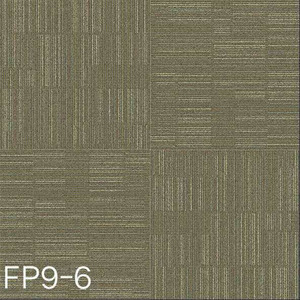
All categories
Featured selections
Trade Assurance
Buyer Central
Help Center
Get the app
Become a supplier

(904 products available)




















































Carpet tile depot are modular carpeting solutions, which have different types of carpet tiles with varying patterns and designs. Each type is unique and caters to different needs and preferences. Some of the popular kinds are as follows:
Woven carpet tiles are known for durability and resilience. These are made using traditional weaving techniques, which involve interlacing the pile yarn and warp yarn. These carpet tiles can withstand heavy foot traffic and last for a long time. They are suitable for commercial spaces and offices.
Tufted carpet tiles are one of the most commonly found carpet tiles in the market. These are made by tufting yarn into a backing material. A secondary backing is attached to make it more durable. There is a vast selection of patterns and designs available in tufted carpet tiles, ranging from subtle monochromes to bold geometrics. These are suitable for homes, offices, and commercial spaces.
Needle-punched carpet tiles are made without using any adhesive. These tiles are made by punching fibers through a backing material using barbed needles. This process interlocks the fibers for better strength and durability. These carpet tiles are cost-effective and are suitable for areas with moderate foot traffic.
Fusion bonded carpet tiles are manufactured by fusing the carpet pile and backing using heat and pressure. This process creates a strong and durable bond, making it a suitable choice for areas with heavy foot traffic.
Carpet loop pile tiles have yarn loops on their surface. These loops can be of the same height or have varying heights to create a textured look. These tiles are known for their natural and luxurious appearance. They are durable, making them suitable for high-traffic areas.
Carpet cut pile tiles have their loops cut. This creates a more uniform and formal look. These tiles are soft and comfortable. They are well suited for homes and low-traffic commercial areas.
Carpet patterned tiles are designed to suit the aesthetic preferences of individuals. These tiles have different patterns, such as florals, geometrics, and abstract designs. They often come in a variety of colors and textures. These carpet tiles can be made using multiple techniques, such as woven, tufted, or printed.
Carpet tiles are designed with a backing material that is usually made from a blend of materials like polyvinyl chloride (PVC) and fiberglass. This backing is treated with polymers to make it durable, strong, and resistant to moisture. On the top of the backing is the pile, the visible part of the carpet tile that people will use. The pile is made from different materials and can be looped or cut. Carpet tiles have a range of designs, patterns, and colors, so they fit in with the style of any room. The tiles are cut to standard sizes of 18x18 inches or 24x24 inches. They are usually less than an inch thick and are designed to be easily installed and replaced. Carpet tiles can be installed using different methods, like peel-and-stick adhesives or interlocking tabs. The tiles are made to be installed without any stretching or power required. They can be tailored to fit the shape of the room by cutting them. They are also very easy to maintain. When one tile is damaged, it can be taken out and replaced with a new one without needing to replace the whole carpet. This makes carpet tiles a more flexible choice than traditional wall-to-wall carpeting.
Carpet tiles are also designed to be durable and long-lasting. The materials used are meant to withstand heavy foot traffic and daily use in commercial spaces. The tiles are also made to be resistant to stains and can be cleaned easily, which makes them a practical choice for areas where spills and dirt are common. Many carpet tiles are designed to be eco-friendly and have recycled materials. This makes them a more sustainable choice for businesses that want to be environmentally conscious.
Carpet tiles are versatile and can be used in a variety of commercial and residential settings. Each scenario has unique needs and demands that the carpet tiles can meet. The usage scenarios are as follows:
Carpet tiles are often used in office buildings, especially in areas like conference rooms, open workspaces, and reception areas. They create a professional appearance, absorb sound, and provide comfort for employees who spend long hours on their feet working at their desks. Carpet tiles also enable easy replacement of only damaged sections without disrupting the entire office space.
Retail stores often use home depot carpet squares in areas with high foot traffic, such as aisles or near checkout counters. The tiles can withstand heavy use, are easy to clean, and come in various designs that match the store's branding.
Hotels and hospitality businesses use carpet tiles in guest rooms, corridors, and public areas. Carpet tiles are stain-resistant, comfortable, and easy to maintain, making them ideal for these spaces. In case of damage, they can be replaced individually without affecting other areas.
Healthcare facilities, such as hospitals and clinics, prefer carpet tiles for their waiting areas, offices, and patient rooms. These tiles are easy to clean and promote infection control. They also help reduce noise, providing a comfortable environment for patients and staff.
Educational institutions, such as schools and universities, often use carpet tiles in classrooms, libraries, and common areas. The tiles are durable, absorb sound, and come in various colors, making them ideal for creating an engaging learning environment. Carpet tiles are also cost-effective as they can be replaced individually when damaged.
Airports and transportation hubs use carpet tiles in waiting areas, lounges, and corridors. The tiles are comfortable, reduce noise, and are easy to install and maintain. They can also be replaced or repaired quickly, even during high traffic periods, without disrupting operations.
Event spaces, such as conference centers and exhibition halls, use carpet tiles in seminar rooms, exhibition halls, and corridors. Carpet tiles are durable, comfortable, and have good sound absorption properties, making them suitable for event spaces. They are also easy to maintain and can be installed and replaced quickly, even during an event.
Co-working spaces and flexible workspaces use carpet tiles in common areas, private offices, and meeting rooms. The tiles are comfortable and create a warm, inviting environment. Their modular design allows for easy replacement of damaged sections, making them cost-effective.
Here are some important factors to consider when selecting the right carpet tiles for a space.
Different spaces have different demands. Busy commercial areas need durable carpet tiles that can withstand heavy traffic, whereas, in a home office, a more comfortable and stylish option may be more suitable. Consider how the space will be used and how much traffic it will receive.
Carpet tiles come in various sizes, designs, and colors. They offer great flexibility in creating different patterns and customizing the look of a space. Choose carpet tiles that complement the existing decor or allow for easy changes to the design in the future.
Regular maintenance is key to keeping carpet tiles looking good. Look for tiles that are easy to clean and replace if needed. Consider the availability of matching spare tiles for future repairs.
Consider the comfort and sound absorption properties of the carpet tiles. In areas where people will be standing for long periods, select tiles with good cushioning. Additionally, in spaces where noise can be an issue, look for carpet tiles with sound-absorbing features.
Choose carpet tiles made from non-toxic materials for better indoor air quality. Some carpet tiles are certified as low-emission or environmentally friendly, reducing their environmental impact.
Calculate how many carpet tiles are needed by measuring the space accurately. Consider the size and orientation of the tiles concerning the layout of the room, ensuring a seamless and balanced appearance.
Set a budget and find carpet tiles that offer a good balance of quality and price. Remember, higher-priced tiles are usually more durable and have better features; they often last longer.
Q1: How can businesses profit from utilizing carpet tiles?
A1: Carpet tiles are known for their durability and longevity, which is a solid business opportunity for suppliers and installers. However, their stain resistance and easy maintenance make them a practical solution for customers. Their modular design allows for easy replacement of damaged tiles, enabling businesses to generate repeat business from clients who need to expand or replace their flooring.
Q2: What are the benefits of modular carpet tiles for business buyers?
A2: Modular carpet tiles offer several benefits to business buyers, including ease of handling and transportation due to their smaller size and reduced weight. They also provide flexibility, as users can combine different tile designs to create custom patterns that match their brand image or interior decor theme. Moreover, in case of damage or staining in a specific area, only the affected tile can be replaced, extending the lifespan of the carpet and reducing long-term maintenance costs.
Q3: How can business buyers ensure color consistency when ordering carpet tiles?
A3: To ensure color consistency, business buyers should request sample swatches from the supplier before making a large purchase. Additionally, it is advisable to order all the necessary tiles for a given area at once, as different production batches may have slight color variations. Consider checking rug tiles home depot for a wide selection.